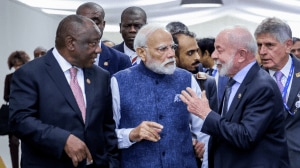FM blames industry for slump
NEW DELHI, NOV 15: Finance minister P Chidambaram has blamed the manufacturing sector for the industrial slump continuing to haunt the Indi...

NEW DELHI, NOV 15: Finance minister P Chidambaram has blamed the manufacturing sector for the industrial slump continuing to haunt the Indian economy.
In an interview to be telecast on Doordarshan-2 on Sunday, he said “there is excess capacity in some industries” adding that while agriculture and services have registered growth, industry particularly manufacturing has not. He also said that some sectors of industry have failed to raise the equity part of new capital.
The finance ministry, according to Chidamabram, could do only four things; namely bring down the interest rates, provide more funds to banks by cutting the reserve ratios, provide foreign exchange for any imports and bring down the inflation rate which was currently about four per cent. “Normally all this should spur growth … it’s a puzzle as it has not,” he said,Chidambaram also admitted that “perhaps there is some undercurrent about the instability of the present government.” Also admitting that bringing down inflation has effected his deficit calculations, the finance minister called it “one of the ironies of controlling inflation.”
He, however, ruled out any further cut in expenditure besides the 5 per cent cut he has already imposed on both plan and non-plan expenditure.
“This will save about 3,500 crore rupees … I don’t want to slash expenditure any further,” he said. He also said that the world-wide stock market crash of a week ago had made “disinvestments more uncertain”. But he said the developments in the South-East Asian markets and their fallout in Germany and New York “were completely unexpected…nobody could have planned for that or predicted that.”
Defending his decision to pull back on GAIL’s GDR issue at the last moment, Chidambaram reiterated his commitment to enter the international market with GAIL “once the market settles down.” As on now, “our decision is to go ahead with MTNL and IOC”, he said.
As for the poor state of the domestic primary market, Chidambaram again blamed industry. “Retail investor is once bitten, twice shy…during 1992 and 1995, a large number of companies came to the market with poor quality of paper, thousands of them are quoting below par … many of those companies have wound up.” He said the investor would always pick up good quality paper whether in shares or debentures, such as the Corporation Bank issue that entered the market last month.
Chidambaram also derided the increasing demand of domestic industry for protectionism. He said, “I see an invisible line dividing one class of entrepreneurs from another. Those who have world-class world-size capacities, those who are professionally managed, with fire in the belly, they are not complaining. It is the more traditional industries, more traditionally managed, who are not flexible enough to adjust their strategies are complaining”.
According to the minister, “there is a shriller cry for protectionism. But I think that is wrong. I can understand that the peace of change of tariffs can be modulated in some sectors to reflect ground realities."
"But I am very clear in my mind that the Indian economy must become a more open economy. And one of the ways in which to make it a more open economy is to bring tariffs at least to the Asian levels if not world levels, and encourage competition between imports and domestic production,” he added.
On the issue of implementation of the report of the Pay Commission, Chidambaram made his opposition to it very clear in an oblique manner. He said, “I think I shouldn’t comment on what the group of ministers decided. In fact, it would be a breach of collective responsibility to do so. I think my silence on the subject was quite eloquent. I have absorbed it now. And I think everyone including civil servants and the people have learned whatever they wished to learn from he episode.”
On being asked whether he thought that the opposition to the Insurance Regulatory Authority (IRA) and the SICA Bills, both by political parties and the industry, was a personal attack on him, the finance minister said, “Chidambaram is quite dispensable but reforms are not. It will be a pity if the IRA bill does not go through in one form or the other." "It is a well known fact that long-term funds are in insurance and in pensions. And if we don’t reform our insurance sector, we do not reform our pension sector, we are not going to mobilise the savings of the people. The bill may not pass today, but has to pass one day or the other. When that day comes I am sure I will stand vindicated.,” he added.
On SICA, Chidambaram said, “If SICA does not pass it will only mean that we are prolonging the agony of sick industries, and of workers, and or creditors, and of banks … we are likely to make many institutions sick. For example, the state industrial development corporations which lend to the state sectors are likely to become sick.”








- 01
- 02
- 03
- 04
- 05























